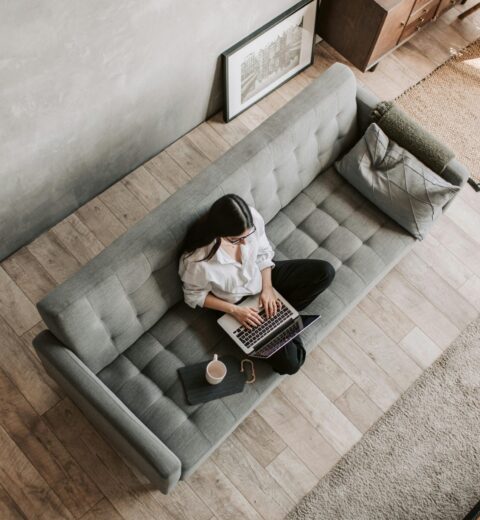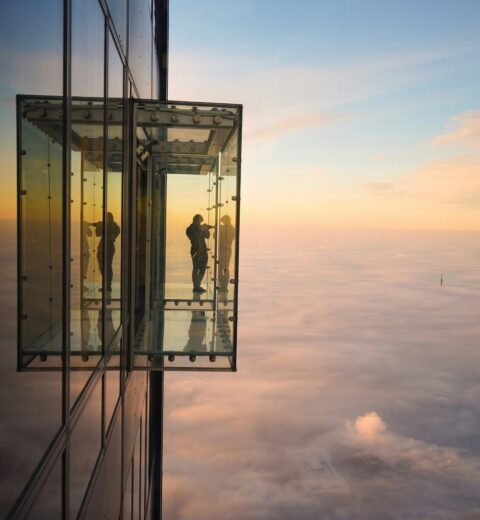Where Coffee and Work Meet :: An Interview with Ruth and Darren @ Timberyard
Week 25 – London. A new feature in the Workplace Series is here! This time we are presenting Timberyard: the place where tea, coffee, work, and play meet and become re-imagined. Through this interview with co-founders Ruth Coppin and Darren Elliott, you get the story behind this innovative concept that connects work-life with excellent tea, coffee, and healthy food.

Ruth and Darren, how did you start the Timberyard concept?
Ruth: How did we start? It all began 5 years ago. I had previously been working in insurance in the City, where I constantly went out for meetings in coffee shops and I decided that there must be a better environment to combine coffee with meetings and workspaces.
So, I started researching the area, spent time in San Francisco and visited places that were encouraging people to come and work from coffee shops. Back in London, I wrote a business plan and found our first location in Old Street, but I very quickly realised that I didn’t have the hospitality experience to do it by myself. Therefore, advertised for a co-founder of the business and met Darren, who is the one with all the hospitality experience and background.
Darren, is your hospitality experience mainly from hotels?
Yes, hotels initially, with a focus on food and drink mainly. After working in hotels for several years, I worked in a very dynamic pub company and subsequently helped with a lot of openings. I then moved away from the license-trading to the food itself, and then to working with coffee. Over the years, I have been involved in a wide selection of hospitality styles and gained experiences that have thought me a lot in terms of branding and building a brand.
In 2012 I joined Timberyard. Together, Ruth and I went on a six-month journey where we toured everything that was current in the speciality coffee industry in London and visited more or less everyone that was trading at that time. We noticed that there was a huge gap in the market for public workspace coupled with exceptional coffee, so through seeing and learning from good and bad solutions, we formed and built our brand.
Since then, we have grown and grown and we have hit various milestones and won various awards, and we gradually got recognition for what we are doing.

How many locations do you have in total?
We started out in Old Street, then we opened one shop in Covent Garden, and then this one in Soho. Unfortunately, we lost Old Street because the building was bought for renovation and we had to relinquish our lease there, but we will continue to look for new opportunities.
Do you think that your growth has allowed you to continue in a more flexible way?
Yes! Our second and third shop have grown and become more refined. For instance, if we view our Soho shop as being the third in a series we can see that it has advanced much further. We have added a new element; the private workspace, that has strengthened the core of what we do and allowed us to explore much more in terms of the facilities we can offer and the community that we can build.
In fact, our growth is making it even more exciting! Now, we would potentially take on much bigger spaces and entire buildings in conjunction with a property partner to expand the private workspace part of Timberyard.

Ruth, can you go through the various elements of your spaces?
In both our locations, we have the public, street-level workspace that is designed as a coffee shop, but with the addition of climate control, music zoning, lots more power sockets than you would find in a traditional coffee shop, and incredibility fast Wi-Fi that we offer as a part of what you purchase in the shop. Then we have the private meeting rooms, such as the one we are sitting in now. We have one in Soho and two in our Seven Dial location, which can all be hired throughout the day either on our website or by coming into our store to book it with us.
Is this meeting room open to the public as well?
Yes, anyone can book our meeting rooms for a two hours’ minimum slot, in which includes a drink and food credit per hour. This way you actually get to make use of all our facilities and get the full Timberyard experience.
In addition, our cafes function as incredibly flexible events spaces. They are designed so we can host events early in the morning or in the evenings to avoid interrupting our core sales during the day. These events include various book launches, product launches, meetups, talks, networking events, art exhibitions, and more.

You mentioned about the private workspace, can you please describe this in more details?
Here in our Soho location, we have added the private workspace for the first time. In this space, which is located on our lower ground floor, people can rent desks on a three-month rolling contract. The price includes their own barista that makes all the speciality teas and coffees for themselves and for their guests, which makes it incredibly attractive to invite people in for meetings. In addition, they get a discount on food and drink in the café in any of our locations.
What is the desk capacity downstairs?
In total, we have forty desks and four meeting rooms that are included in the fee.
Is this an open-plan working space?
Yes, and that is really important to us because many of our competitors will put you in glass boxes and we don’t want that here. For us, it is essential that our members can feel like a part of our community, not like someone who is being screened away in glass boxes.
Is it mostly freelancers renting the private workspace?
No, because we have a four-desks minimum requirement. However, upstairs it’s slightly more freelancers, startups, and independent professionals, and then the private workspace function more like the next stage for their businesses. Because of this, the ground floor area is, in fact, a brilliant source to attract interest for our private space, and we plan to always attach a private workspace to our public shops.

How and why did you make this transaction from individual members to small groups?
It was a conscious decision that derived from the first three months of operating with individual memberships. We had such a huge interest from small companies that were interested in renting several desks and wanted the benefits of working alongside other companies, in which turned out to be a greater demand than the demand from individuals.
So, we reacted quickly, used what we learned from our members and from our customers, and created the private workspace.
From which sectors are most of your members from and why is that?
Most of our members downstairs are in the technology sector and I think the main reason for that is our location here in Soho. We choose our locations very carefully in order to be fully immersed in our market. There are always going to be places where it works well, but we have noticed certain locations where this concept works extremely well. For instance, we would choose London Bridge over Notting Hill because our market just isn’t over there.

Now, moving on to your menus, do you have some selection criteria for food and drinks?
We have selected properties that have an A1 license, which means that we only prepare food on site and not cooking. As a result, we have selected the best, small food operators in London that we cooperate with and this gives us a creative freedom in terms of how we construct our menus. We are able to put a wide range of food together and create the best breakfasts, lunches, teas, and drinks for our customers.
The food is designed to go hand in hand with the environment. People are working and need to eat something that is healthy because it is all about their personal wellness. Therefore, nothing on our menu is particularly heavy but rather designed to inspire energy and production. We have been inspired by our customers’ demand and wish to understand what we put in our bodies. As a result, we have invented delicious menus where 85% is vegetarian, much of it is vegan and a lot is gluten free and dairy free.
In terms of usage, I believe the different people use the space in different ways. Do you have any ways to monitor the hours your clients spend here and how much they are consuming?
It is always on our radar and it is the one question that people have been asking us from day one. Many people have their own experience with putting free WiFi into their space and, in many cases, it has ended badly. It does take constant managing and we will keep track on how long people have been here and when they last ordered. If it is needed, we politely ask them to order something, otherwise, this business would not be here. It is very important that we do that because we want to see that everyone is buying into the concept throughout the day.

What are the main challenges and opportunities for Timberyard over the next few years?
Funding is always a challenge and increasing business rates is a huge factor at the moment. For instance, here in Soho, business rates are said to be doubling. At the same time, the increasing competition is also something that we have to be aware of.
And opportunities?
It will have to be the increasing amount of workspace demand. I don’t think we are anywhere saturated in London in terms of coworking space. We believe that there is a shift in the way people are working: more and more people are working remotely and looking for this style of creative workspaces, and that trend is continuously growing.
What about partnerships with property companies, do you see that as an opportunity?
Yes, absolutely! Collaborating with all sorts of organisations, such as property companies and businesses like Facebook, is always interesting. Exciting partnerships are also great in terms of continuously bringing in new opportunities to our business.
Thank you for your great hospitality, Ruth and Darren @ Timberyard!




